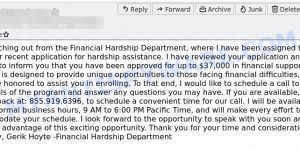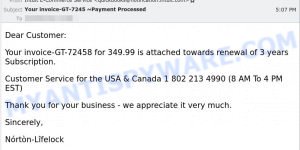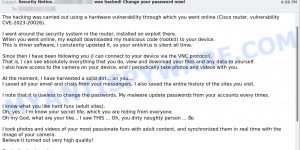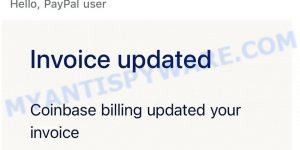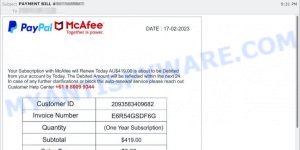The Avira Assistance PayPal Invoice Scam Email is a recent example of a phishing scheme that targets PayPal users. This scam involves sending an email to the recipient, claiming to be an invoice for a purchase made through PayPal. However, the invoice is fake, and the scammer is attempting to trick the recipient into providing their personal and financial information.
In this article, we’ll take a closer look at how this scam works and what steps you can take to protect yourself from falling victim to it.
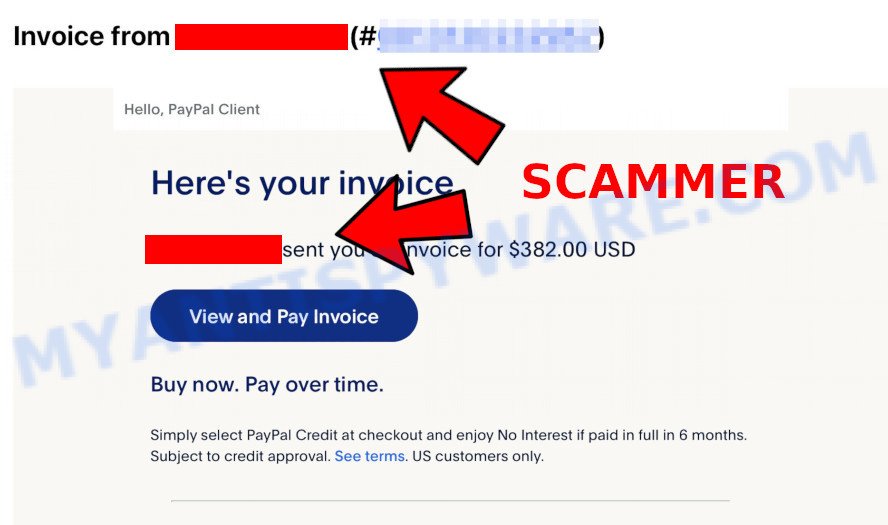
QUICK LINKS
- How the scam works
- What to do when you receive the PayPal Avira Assistance Invoice Scam Email?
- Here are some ways to recognize a fake PayPal Email?
- Report a Scam
How the scam works
Fraudsters obtain the email addresses of their victims through different means, like buying email lists or using automated tools to guess common email addresses. Once they have the email address, they send a false PayPal invoice appearing to come from Avira Assistance.
The email demands a payment of $459.00 USD and contains a link to pay the invoice, as well as mentions the possibility of using PayPal Credit to make the payment. Additionally, the email warns that a third party may have compromised the recipient’s PayPal account and instructs them to contact a particular phone number to resolve the issue.
If the recipient calls the number, the scammers will attempt to get hold of their personal and financial information, like credit card numbers or PayPal login details, under the guise of helping to cancel the payment or dispute the transaction. They may use different tactics to persuade the recipient to give up their information, such as offering a refund or creating a sense of urgency.
A typical PayPal Avira Assistance Invoice Scam Email reads as follows:
Invoice from Avira Assistance (#xxxxxxxx)
Hi Paypal User,
Here’s your invoice
AVIRA ASSISTANCE () – sent you an invoice for $459.00 USD
Due on receipt
View and Pay Invoice
Seller note to customer
Thank You
Don’t know this seller?
You can safely ignore this invoice if you’re not buying anything from this seller. PayPal won’t ask you to call or send texts to phone numbers in an invoice. We don’t ask for your credentials or auto-debit money from your account against any invoices. Contact us if you’re still not sure.
Help & Contact | Security | Apps
Twitter Instagram Facebook LinkedIn
PayPal is committed to preventing fraudulent emails. Emails from PayPal will always contain your full name. Learn to identify phishing
Please don’t reply to this email. To get in touch with us, click Help & Contact.
Not sure why you received this email? Learn more
Copyright © 1999-2023 PayPal. All rights reserved.
PayPal (Europe) S.à r.l. et Cie, S.C.A. Société en Commandite par Actions Registered Office: 22–24 Boulevard Royal, L-2449 Luxembourg RCS Luxembourg B 118 349
PayPal (Europe) S.à.r.l et Cie, S.C.A is duly licensed as a Luxembourg credit institution and is under the prudential supervision of the Luxembourg supervisory authority, the Commission de Surveillance du Secteur Financier.
PayPal is deemed authorised and regulated by the Financial Conduct Authority. The nature and extent of consumer protections may differ from those for firms based in the UK. Details of the Temporary Permissions Regime, which allows EEA-based firms to operate in the UK for a limited period while seeking full authorisation, are available on the Financial Conduct Authority’s website. Some PayPal products including PayPal Pay in 3, and PayPal Working Capital are not regulated by the Financial Conduct Authority.
It is important to note that PayPal and Avira will never ask for personal or financial information over the phone, and legitimate customer support numbers can be found on their official websites. If you receive an unexpected email or phone call asking for personal or financial information, it is best to independently verify the legitimacy of the request by contacting the company directly through its official channels.
Examples of such scams
Here are some examples of scams similar to the PayPal Avira Assistance Invoice Scam. Financial Hardship Department Scam Email, Amazon Account Locked Scam, Geek Squad Email Scam 2023 and Intuit Norton Lifelock Scam are some of the scams we reported recently.
- Financial Hardship Department Scam Email
- Intuit Norton Lifelock Scam Email
- I am a spyware software developer Email Scam
- PayPal Coinbase Invoice Scam Email
- PayPal McAfee Scam Email
What to do when you receive the scam email
If you receive a PayPal Avira Assistance Invoice Scam Email or any other suspicious email claiming to be from PayPal or Avira Assistance, here are some steps you can take:
- Do not believe this message.
- Do not call the provided phone number.
- Do not provide any personal or financial information. Legitimate companies, such as PayPal or Avira, will never ask you to provide sensitive information such as your password, credit card number, or social security number in an email.
- Do not click on any links or attachments in the email. These links may lead you to a fake website designed to steal your personal and financial information or infect your device with malware.
- Log in to your PayPal account directly. Go to the PayPal website by typing the URL into your browser and log in to your account to check for any unauthorized transactions.
- Be careful if you get odd emails from a friend or Family Member. They could have had their email account hacked.
- Report the email to PayPal or Avira Assistance, and FTC at https://www.ftc.gov/ You can forward the suspicious email to the company’s fraud department or use the reporting tools available on their official websites.
- Once you have reported the email and verified that it is a scam, delete it from your inbox and trash folder to avoid accidentally clicking on any links in the future.
- If you have paid a scammer, the sooner you act, the better. Use the steps (https://consumer.ftc.gov/articles/what-do-if-you-were-scammed) to try to stop a transaction, get a transaction reversed, or get a refund.
- If you have already clicked on a link or provided any personal or financial information, it is important to monitor your accounts for any unauthorized transactions or suspicious activity. You should also consider changing your passwords and enabling two-factor authentication for added security.
- Scan your device for malware using free malware removal tools.
It is always better to err on the side of caution when it comes to suspicious emails, especially those that ask for personal or financial information or create a sense of urgency. By being vigilant and taking the necessary precautions, you can protect yourself from falling victim to scams like the PayPal Avira Assistance Invoice Scam.
Threat Summary
| Name | PayPal Avira Assistance Invoice Scam Email / Invoice from Avira Assistance Email |
| Type | Phishing, Scam, Social Engineering |
| Fake Claims | You sent a payment of $459. 00 USD to Avira Assistance corporation; If you did not make this payment or to cancel this transaction contact our customer support |
| Distribution methods | spam email campaigns |
| Damage | theft of your sensitive information (PayPal login credentials or payment information), significant financial loss, identity theft and further fraud |
| Protection | To avoid the damage caused by this scam, we recommend using the steps above. |
Here are some ways to recognize a fake PayPal Email

Recognizing a fake PayPal email can be difficult, but there are several key signs to look for that can help you spot a scam:
- Unusual sender email address. Fake PayPal emails often come from a sender email address that is slightly different from the official PayPal email address. Make sure to double-check the sender’s email address before taking any action.
- Urgent requests for personal information. PayPal will never ask for sensitive information such as your password, social security number, or credit card information in an email. Be wary of any email that asks for this type of information.
- Typos and grammatical errors. Scammers are not known for their attention to detail, and fake PayPal emails may contain typos and grammatical errors.
- Requests for payment outside of PayPal. PayPal will never ask you to make a payment outside of the PayPal platform. If an email asks you to pay using a different method, it is likely a scam.
- Unusual payment or transaction amounts. If you receive an email about a payment or transaction that you do not recognize, or if the amount seems unusual, be cautious and double-check your PayPal account to confirm the transaction.
- Domain name is misspelt. Scammers often use domain names that are slightly misspelled to trick you into thinking that the email is from PayPal. Be sure to double-check the domain name of the sender before taking any action.
- Generic greetings. PayPal will typically address you by your name or your email address. Be wary of emails that use generic greetings such as “Dear valued customer.”
- Suspicious links. Be careful of clicking on links in emails that you are not familiar with, as they may lead to malicious websites designed to steal your personal information.
- Unexpected attachments. If you receive an email with an unexpected attachment, do not open it. Attachments can contain malware or viruses that can harm your computer.
- Unofficial phone numbers. Do not trust phone numbers listed in emails that are not from the official PayPal support channels. If you need to contact PayPal customer support, the best way is to log in to your account and use the contact information provided there.
By keeping these points in mind, you can help protect yourself from fake PayPal emails and keep your information and funds secure.
Report a Scam
If you have received the PayPal Avira Assistance Invoice Scam Email or an email that is similar but not the same as the example above, then post it as comment on this article. This helps us to warn users about current scams, monitor trends and disrupt scams where possible.
